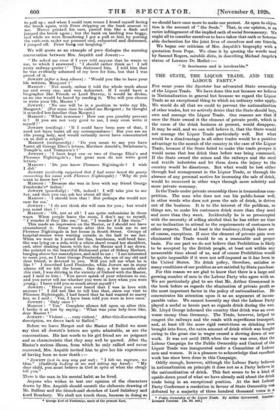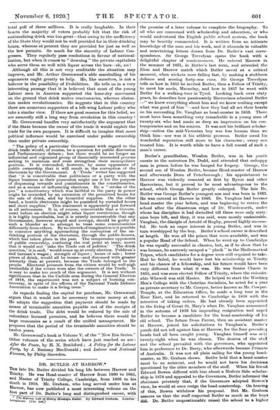'lab STATE, 1111, LIQUOR TRADE, AND THE LABOUR PARTY.* Fon
some years the Spectator has advocated State ownership of the Liquor Trade. We have done this not because we believe in Nationalization in general but because we regard the Liquor Trade as an exceptional thing to which ma ordinary rules apply. We would do all that we could to prevent the nationalization of other trades, but we actively desire that the State should buy, own and manage the Liquor Trade. Our reasons are that if once the State owned it the element of private profit, which is the curse of the drink business at present, would disappear. It may be said, and we can well believe it, that the State would not manage the Liquor Trade particularly well. But what would be a disadvantage in all other trades would be a positive advantage to the morals of the country in the case of the Liquor Trade, because if the State failed to make this trade prosper it would mean that less drink than before was being consumed. If the State owned the mines and the railways and the steel and textile industries and let them down the injury to the country would be disastrous. But what would be lost either through bad management in the Liquor Trade, or through the absence of any personal motive for increasing the sale of drink, would be recovered in other ways through more sobriety and more private economy.
In the Trade under private ownership there is tremendous com- petition. The man who does not run his public-house well, in other words who does not press the sale of drink, is driven out of the business. It is to the interest of the publican, as things are, to make his customers drink more than they need and more than they want. Incidentally he is so preoccupied with the necessity of selling alcohol that he has either no time or no inclination to attend to the requirements of customers in other respects. That at least is the tendency, though there are of course, exceptions. If once the element of private gain were eliminated the Trade would be on a reasonable and proper basis. For our part we do not believe that Prohibition is likely to be accepted by the British people, at least not within any measurable time ahead of us, and of course Prohibition would
be quite impossible if it were not self-imposed as It been in the United States. No drink policy, therefore, satisfies so many conditions of our problem as are satisfied by State purchase.
For this reason we are glad to know that there is a large and
growing number of men in the Labour Party who agree with us. We are particularly glad to see that Mr. Arthur Greenwood in the book before us regards the elimination of private profit as the most important factor in the policy of nationalization. He concentrates his attention upon it as an argument of incom- parable value. We cannot honestly say that the Labour Party played a useful or heroic part as regards drink during the war. Mr. Lloyd George informed the country that drink was an even worse enemy than Germany. The Trade, however, helped to congest the railways and the roads with superfluous transport, and, at least till the more rigid restrictions on drinking were brought into force, the extra amount of drink which was bought owing to the great rise in wages caused a slowing down of war work. It was not until 19I9, when the wax was over, that the Labour Campaign for the Public Ownership and Control of the Liquor Trade was inaugurated under a Committee of Labour men and women. It is a pleasure to acknowledge that excellent work has since been done in this Campaign.
Oddly enough, however, although the Labour Party believes in nationalization on principle it does not as a Party believe in
the nationalization of drink. This fact seems to be a kind of upside-down proof of what we have already said about the drink trade being in an exceptional position. At the last Labour Party Conference a resolution in favour of State Ownership was defeated by a majority of three hundred thousand votes in 11, • Public Ownership of the Liquor l'rnds. By Arthur Greenwood. London : Leonard Parsons. L4s. Od. net.] -
total poll of three millions. It is really laughable. In their hearts the majority of voters probably felt that the risk of nationalizing drink was too great—that owing to the inefficiency of the State they would not be well provided for in their drinking hours, whereas at present they are provided for just as well as the law permits. So much for the sincerity of Labour Con- gresses. They regularly pass resolutions in favour of national- ization, but when it comes to " downing " the private capitalists who serve them so well with liquor across the bars—oh, no !
Although all this is not very creditable the situation may improve, and Mr. Arthur Greenwood's able marshalling of his arguments ought greatly to help. He, like ourselves, is not a believer in the possibility of Prohibition. He tells us in a very interesting passage that it is believed that most of the young Labour men in America supported the bone-dry movement on the ground that drink makes reactionaries, whereas absten- tion makes revolutionaries. He suggests that in this country there are numerous supporters of a left-wing Labour policy who take a similar view. If there are good reasons for this belief, we are assuredly still a long way from revolution in this country!
Mr. Greenwood handles very satisfactorily the argument that if the State became the owner of the trade it would exploit the trade for its own purposes. It is difficult to imagine that more political influence would be exercised under public ownership than under private ownership.
"The policy of a particular Government with regard to the drink trade would, of course, be a question for public discussion and Parliamentary debate ; but there would be no longer an Influential and organized group of financially interested persons waking to maintain and even strengthen their monopolistic position. It is contended, however, by some opponents of public ownership that it will result in the corruption of the electorate by the Government. A • Trade' writer has suggested that it is conceivable that politicians or a party with the liquor business in their possession might use it for the purpose of dispensing rewards and punishments in the constituencies, and as a means of influencing elections. By a "stroke of the pen" a constituency which was faithful to the party in power might be rewarded by an extension of the permitted hours for the sale of drink, and by bountiful supplies. On the other hand, a hostile electorate might be punished by curtailed hours and short supplies' This statement is apparently put forward in all seriousness. It is, of course, conceivable that a Govern- ment before an election might relax liquor restrictions, though it is highly improbable, but it is utterly inconceivable that any Government, however stupid and corrupt, should be guilty of such a blunder as to attempt to treat some constituencies differently from others. By no stretch of imagination is it possible to conceive anything approaching the corruption of the un- thinking portion of the electorate, through the public-houses, which has taken place in the past. The temperance opponents of public ownership, confusing the real point at issue, assert that it would not 'take the Trade out of politics.' 'The drink question,' it is said, 'would come up at every election. Publican's and barman's wages ; strength of liquor ; hours of sole; lower prices of drink, would all be issues—and discussed with greater intensity than at present, because the Trade belonged to the people. Electoral pressure from the citizen would be well-nigh irresistible if the voters were also the owners of the Trade.' It iR easy to make too much of this argument. It is not without significance that in the Carlisle area during the General Election of 1918, the experiment was not a subject of burning con- troversy, in spite of the efforts of the National Trade Defence Association to make it a living issue."
As regards finding the capital for purchase, Mr. Greenwood argues that it would not be necessary to raise money at all. He adopts the suggestion that payment should be made by means of terminable annuities payable out of the receipts of the drink trade. The debt would be reduced by the sale of redundant licensed premises, and he believes there would he large economies as a result of the unified management. He proposes that the period of the terminable annuities should be twelve years.
Mr. Greenwood's book is Volume V. of the "New Era Series." Other volumes of the series which have just reached us are : After the Peace, by H. N. Brailsford ; A Policy for the Labour Party, by J. Ramsay MacDonald ; and Labour and National Finante, by Philip Snowden.







































 Previous page
Previous page